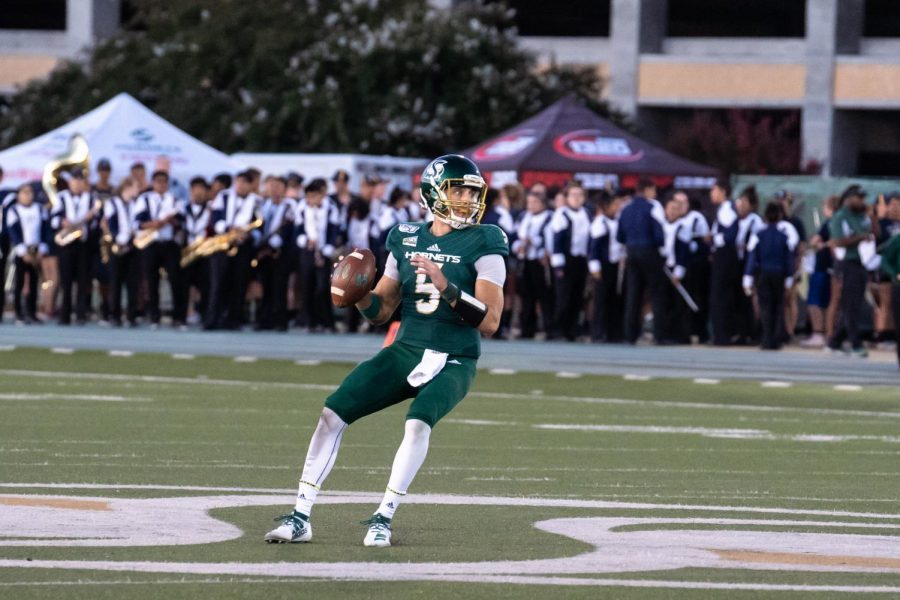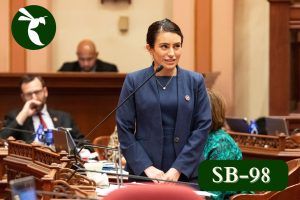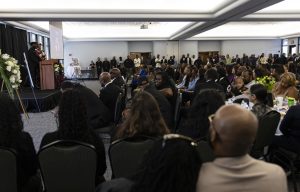EDITORIAL: College athletes should be allowed to profit from endorsements
Sac State junior quarterback Kevin Thomson prepares to throw a pass against Northern Colorado on Saturday, Sept. 14, at Hornet Stadium. If Gov. Gavin Newsom signs SB 206, players like Thomson will be able to profit off their likeness.
September 19, 2019
Senate Bill 206, the Fair Pay to Play act, is currently on Gov. Gavin Newsom’s desk for signing after blazing through the California Legislature last week with unanimous votes in both the Assembly and Senate.
If passed, the bill “would prohibit California postsecondary educational institutions (from) preventing a student participating in intercollegiate athletics from earning compensation as a result of the use of the student’s name, image, or likeness or obtaining professional representation.”
In English, the bill would allow college athletes in California to make money off their likeness, take endorsement deals and hire agents without being disqualified from competition.
RELATED: California college athletes could profit from endorsements if Newsom signs bill
There’s really no reason the bill shouldn’t pass — it’s not directly awarding athletes money, it’s just allowing them the potential opportunity to make money. Why should they not have options?
The current nationwide practice of not allowing college athletes to take endorsements or otherwise make money off their image is a tired and classist policy that should be repealed across the country, with California Senate Bill 206 hopefully representing the start of a larger movement.
A 2017 study by the National College Players’ Association found that 86 percent of college athletes in the United States live below the poverty line. That same year, the NCAA earned nearly $1.1 billion, $800 million of which came from TV-rights deals with CBS and Turner.
College athletes are a huge part of this multi-billion-dollar industry. And yet, while colleges are allowed to sign profitable endorsement deals, the athletes whose very images is being profited from are not.
In addition, college athletes often spend too much time at games and practice to get a job, or in some cases are barred from holding a job during the season entirely. Students asking for endorsement money isn’t necessarily a greedy profit-based move — for many, it’s a matter of making enough pocket change to pay for non-scholastic expenses. Basically, for survival.
RELATED: #SacStateSays: ‘What do you think about college athletes taking endorsement deals?’
This bill doesn’t take away from the fact that student-athletes do not actually get paid by schools to play. Therein lies the distinction between a professional athlete and a college athlete.
“If the bill becomes law and California’s 58 NCAA schools are compelled to allow an unrestricted name, image and likeness scheme,” the NCAA said in a letter to Newsom. “It would erase the critical distinction between college and professional athletics and, because it gives those schools an unfair recruiting advantage, would result in them eventually being unable to compete in NCAA competitions.”
Another issue is exactly how the NCAA defines being a professional athlete.
The NCAA is masquerading its apprehension about the bill as a concern for the distinction between college and professional athletics. But what this debate is really about — as debates at this level often are — is money.
“My brother streams Twitch and he got denied eligibility because he was making money off his likeness,” said Jarrel Anderson, business administration and marketing major and a Sac State student-athlete, to The State Hornet in a video on SB 206.
Really? Making money off a Twitch stream completely unrelated to athletic endeavors counts as profiting off ones’ likeness, and therefore gets your NCAA eligibility revoked?
It’s time that the NCAA be held accountable for taking advantage of athletes for profit. It’s time that athletes got a slice of the pie that they themselves helped create in the first place.


























































































































Mac Heebner III • Jan 10, 2020 at 1:52 pm
I AGREE !